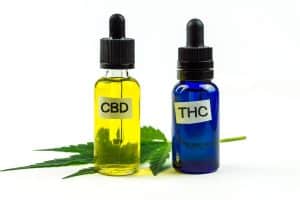
Living with ongoing pain can feel overwhelming, whether it’s arthritis, back pain, migraines, or recovery from injury. Many adults are searching for safe, non-opioid alternatives to manage discomfort without the risks associated with prescription painkillers.
Two of the most discussed options today are CBD (cannabidiol) and THC (tetrahydrocannabinol). At Harmonia Health Solutions, we understand that deciding between CBD and THC for pain relief can feel confusing, but learning how they differ makes the choice clearer.
If you’re ready to explore holistic and medical guidance designed for your needs, contact us today to schedule a consultation with one of our licensed providers.
Both CBD and THC come from the cannabis plant, yet they affect the body differently.

Many patients choose CBD for daily support since it may ease discomfort without impairing mental clarity. Studies suggest potential benefits for conditions such as arthritis, fibromyalgia, and neuropathy, though more large-scale clinical research is still needed.
THC is psychoactive and is the compound responsible for the high associated with cannabis. It binds strongly to cannabinoid receptors in the nervous system, which play a central role in regulating pain signals.
This stronger binding often produces greater relief, making THC especially valuable for patients experiencing more severe or acute pain. Evidence supports its role in easing neuropathic pain and providing comfort for cancer patients, including those undergoing chemotherapy.
While effective, THC can cause side effects such as drowsiness, coordination issues, or anxiety in some individuals, which is why professional guidance is recommended.
Patients often turn to CBD for chronic pain because it may reduce inflammation and discomfort without affecting mental sharpness.
Research points to:
 Long-term safety: CBD has low abuse potential, but it can raise liver enzymes and interact with prescription drugs.
Long-term safety: CBD has low abuse potential, but it can raise liver enzymes and interact with prescription drugs.CBD is available in oils, capsules, topical creams, and sprays, giving patients multiple ways to integrate it into their routines.
For patients with severe or disruptive pain, THC may offer stronger relief. Evidence and real-world use suggest:
Common risks include drowsiness, coordination problems, and anxiety. Patients should avoid driving after use.
There is no universal answer to whether CBD or THC works best, it depends on each person’s unique situation. CBD is often preferred for chronic inflammation, arthritis, and neuropathy because it can be used daily without causing intoxication.
THC, on the other hand, may offer more noticeable relief for severe or acute pain, such as pain experienced during cancer treatments or advanced neuropathy.
For many, the most effective approach combines both CBD and THC in carefully controlled amounts. This method can deliver strong pain relief while limiting unwanted side effects.
Since individual responses vary, the safest way to decide is through consultation with a licensed healthcare provider who understands both traditional and holistic treatment options.
Choosing between CBD and THC for pain management involves more than effectiveness, safety and access are equally important. Hemp-derived CBD is widely available and federally legal in the United States, while THC laws depend on state regulations.
Patients exploring CBD or THC should begin with low doses and gradually adjust as needed, since tolerance and response differ by individual. Possible side effects include mild fatigue with CBD or drowsiness and coordination issues with THC.
Both may also interact with prescription medications, so speaking with a licensed provider before starting treatment is always the safest step.
Many patients considering CBD or THC for pain relief also ask whether these options are legal and accessible.
 THC Legality: THC regulations vary from state to state. Some states allow recreational and medical use, while others restrict THC strictly to medical programs or prohibit it altogether.
THC Legality: THC regulations vary from state to state. Some states allow recreational and medical use, while others restrict THC strictly to medical programs or prohibit it altogether.At Harmonia Health Solutions, our licensed providers guide patients through both the medical and practical aspects of exploring CBD and THC for pain relief.
CBD and THC both contribute to pain management, and neither should be viewed as universally better or worse. The most effective choice depends on your personal health needs. CBD may provide safe, daily relief for long-term inflammation, while THC may be a stronger option for severe conditions when used responsibly.
At Harmonia Health Solutions, we are here to help you explore your options with compassion, expertise, and secure telehealth access. If you are considering CBD vs. THC for pain relief, call us today to speak with a licensed provider who can help you determine the best fit for your needs.
Disclaimer:
This article is for informational purposes only and does not replace professional medical advice. Always consult with a licensed healthcare provider before starting or changing any treatment.

At Harmonia Health Solutions, your privacy and safety are our top priorities. We comply with HIPAA regulations to ensure that your personal information is protected, and our consultations are conducted by licensed healthcare professionals who adhere to the highest medical standards.
You’ll find information about longevity products and alternative health services, as well as news regarding the most recent holistic health and wellness research.